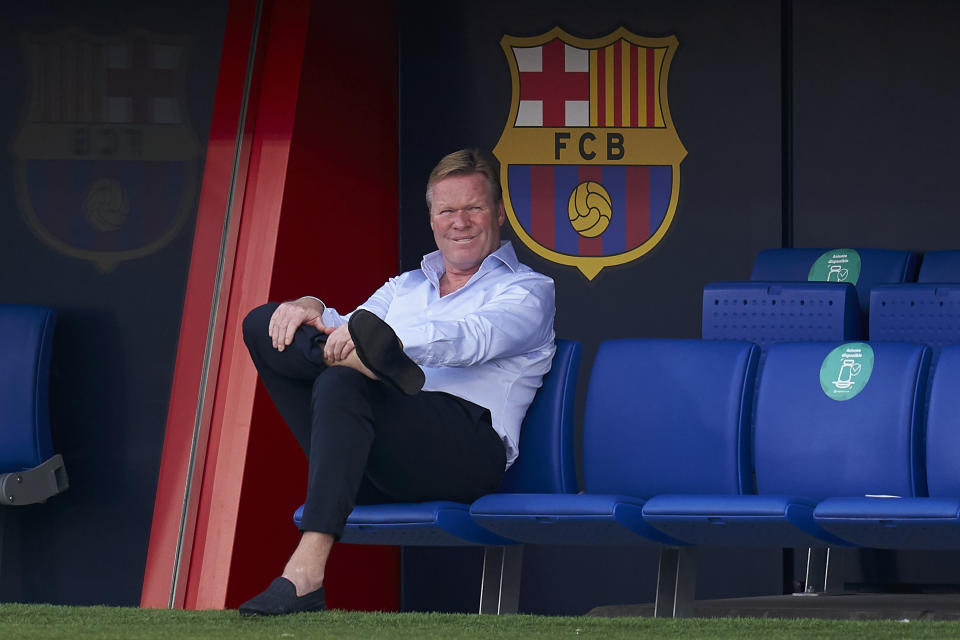Not even a pandemic could stop soccer's transfer spending spree, which makes this window all the murkier
On Monday morning, Barcelona announced that it had lost about $114 million after taxes last season.
On Monday night, Barcelona tried to sign forward Memphis Depay from Lyon and defender Eric Garcia from Manchester City before the closure of the summer transfer window all the same.
Both deals fell through. But the reason they didn’t get over the line wasn’t a lack of intention to spend on the club’s part, but a failure to offload Ousmane Dembele, getting him off the payroll first.
Barca made five transfer signings this window anyway. Granted, it balanced the books on its transfer activity — chiefly because it swapped Arthur for Miralem Pjanic and a bag of money with Juventus — but something about the entire business felt untoward nonetheless.
If consistency and internal logic is what you seek, soccer is not the place you will find it. The sport’s contradictions are many and well-established. This summer, however, it has veered into something murkier still, something that feels tasteless and perhaps even immoral.
It was to be expected, perhaps, that the transfer rumors would careen through the sport as usual, as if nothing was going on, as if a pandemic hadn’t paused the game for three months. Transfer rumors are soccer’s love language. They are currency. But for those rumors to manifest into actual deals is, for lack of a more scientific term, icky.

Let’s get back to Barcelona’s financial statement. It posted revenues of just over a billion dollars in the 2019-20 season, about $240 million short of projections. It blamed that shortfall entirely on the pandemic. Had COVID-19 not ravaged the world, Barca would have made a $13 million profit, it says. And it maintains that it would have become the first club to pass the billion euro revenue threshold, an objective it has pursued feverishly the last few years.
During Spain’s lockdown, Barcelona saved some $87 million by furloughing staff and agreeing to a temporary pay cuts with its players. Still, the club’s debt stands at $575 million, although it explains about a fifth of that away as investment in a stadium remodel and infrastructure project in the surrounding neighborhood. It also claims financial exigency through the pandemic to justify almost doubling the debt/earnings ratio allowed in the club’s statutes. It’s some convenient accounting.
The point is that the club, by its own disclosure, spent very nearly $2 billion on new players in the last decade, with a net outlay of $870 million, yet is saddled with enormous debt. And in spite of requiring its employees and players to go without or reduced pay during some of the pandemic, it happily went shopping once the transfer window opened. It reinvested everything it made from selling players in its squad, and would have run a deficit if those final deals had been consummated. It chose to pay for those new signings over making its players or staff whole, or addressing its mounting debt.
More ludicrous still was Arsenal’s capture of Atletico Madrid midfielder Thomas Partey for a reported $59 million on the same day that it announced laying off its beloved mascot Gunnersaurus, who went extinct after 27 years with the club, as a cost-cutting move.
The cognitive dissonance is real.
The European Club Association, a sort of trade group for soccer clubs, claims that the pandemic will cost its members some $4.5 billion in lost revenues. This summer window, roughly $4.8 billion changed hands in transfer fees among Europe’s five biggest leagues alone. An awful lot of that money simply moved around between the clubs, staying in the market. But that there was market movement at all is remarkable, given the perilous financial situation that already threatens the existence of well-established clubs, like for instance Malaga in Spain.
The spending continues. The clubs blithely press on. Sure, they have money problems. And, yes, their revenues are way down. Certainly, no club really knows when fans will be allowed back into the stadiums in the most profitable leagues in England and Spain. But they’ve got to have that new center back. The winger that will make all the difference. Cover for their striker.
The transfer show must go on. All the rest can be figured out later.
Leander Schaerlaeckens is a Yahoo Sports soccer columnist and a sports communication lecturer at Marist College. Follow him on Twitter @LeanderAlphabet.
More from Yahoo Sports:

 Yahoo Lifestyle
Yahoo Lifestyle 
